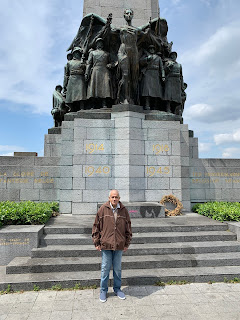Brussels - Beating Heart Of European Union
From a medieval settlement in the swamps of the Senne ( a principal water source for the city) to the beating heart of European Union, Brussels certainly has an interesting history.
Brussels humbly started out as a small settlement by the river Senne, around 10th century. It is said that the name Brussels originates from the word ' Broekzele' translates into "Settlement in the swamp". Some historians state the existence of Brussels began as early as 7th century while others
claim the city started as a fort built by Charles of Lorraine around 979. What is certain is that Brussels originates from three spots around Senne, a valley and two nearby hills. The city was first mentioned as a Portus - a River post.
The Grand place was referred to in 1147 as the 'Lower Market' situated close to the port on Senne and along an important road. The market place did well as a bustling center for trade. But the buildings that make the Grand Place famous today were built and rebuilt much later. The entire Grand place was rebuilt after it was bombed by the army of Louis XIV in 1695, which happened during nine years' war which did not influence the outcome of the war, it signaled the beginning of an age in which fortified city walls lost their significance. The rebuilding of Brussels happened quickly, however, the marvelous results can still be seen today.
Brussels received its 'Town Rights" in 1229, meaning it could govern itself independently as a city.
This marks the beginning of Brussels as an actual city with its own governance. The city became twin capital of U.K. of Netherlands, the capital of Belgium and the heart of European Union.
In 1830, a revolution took place in Brussels that would send a shock wave throughout the country.
Before that, Belgium had been a part of U.K.of Netherlands known as 'Southern Netherlands'. The reasons for the rebellion against Willem I were varied. Fist, he made Dutch the national language. This was not only acceptable to Wallonia ( a province rich in Iron and Coal), French speaking upper class. Secondly, the Catholic South greatly distrusted the protestants. The matters were further aggravated, economy did badly in the region and harvest that year had been poor spreading further unrest.
During Second world war, Brussels underwent Nazi occupation. Nevertheless, the city remained hostile towards Germany. The Mayor of Brussels refused to distribute the star of David Badges,even though he agreed to make a register of Jewish residents. The city was liberated by Welsh guards
in 1944. Many commemorations of the second world war can be found in Brussels today. There are many streets named after important members of Allied forces such as Franklin Roosevelt and Bernard Montgomery. The city become the de-facto capital of European Union and NATO of which Belgium is a founding member.The Belgium world's fair held in 1958 was the first large scale world's fair after the second world war. The exhibition site is now an attraction with miniatures called, Mini Europe.
THE EUROPEAN UNION
The idea of co-operation across European borders came after second World War. After signing the Maastricht treaty in 1992, European Union was born.
- - - - - - - - - -
Brussels humbly started out as a small settlement by the river Senne, around 10th century. It is said that the name Brussels originates from the word ' Broekzele' translates into "Settlement in the swamp". Some historians state the existence of Brussels began as early as 7th century while others
claim the city started as a fort built by Charles of Lorraine around 979. What is certain is that Brussels originates from three spots around Senne, a valley and two nearby hills. The city was first mentioned as a Portus - a River post.
The Grand place was referred to in 1147 as the 'Lower Market' situated close to the port on Senne and along an important road. The market place did well as a bustling center for trade. But the buildings that make the Grand Place famous today were built and rebuilt much later. The entire Grand place was rebuilt after it was bombed by the army of Louis XIV in 1695, which happened during nine years' war which did not influence the outcome of the war, it signaled the beginning of an age in which fortified city walls lost their significance. The rebuilding of Brussels happened quickly, however, the marvelous results can still be seen today.
Brussels received its 'Town Rights" in 1229, meaning it could govern itself independently as a city.
This marks the beginning of Brussels as an actual city with its own governance. The city became twin capital of U.K. of Netherlands, the capital of Belgium and the heart of European Union.
In 1830, a revolution took place in Brussels that would send a shock wave throughout the country.
Before that, Belgium had been a part of U.K.of Netherlands known as 'Southern Netherlands'. The reasons for the rebellion against Willem I were varied. Fist, he made Dutch the national language. This was not only acceptable to Wallonia ( a province rich in Iron and Coal), French speaking upper class. Secondly, the Catholic South greatly distrusted the protestants. The matters were further aggravated, economy did badly in the region and harvest that year had been poor spreading further unrest.
During Second world war, Brussels underwent Nazi occupation. Nevertheless, the city remained hostile towards Germany. The Mayor of Brussels refused to distribute the star of David Badges,even though he agreed to make a register of Jewish residents. The city was liberated by Welsh guards
in 1944. Many commemorations of the second world war can be found in Brussels today. There are many streets named after important members of Allied forces such as Franklin Roosevelt and Bernard Montgomery. The city become the de-facto capital of European Union and NATO of which Belgium is a founding member.The Belgium world's fair held in 1958 was the first large scale world's fair after the second world war. The exhibition site is now an attraction with miniatures called, Mini Europe.
THE EUROPEAN UNION
The idea of co-operation across European borders came after second World War. After signing the Maastricht treaty in 1992, European Union was born.
- - - - - - - - - -












Comments